
Glycogen is a multibranched polysaccharide of glucose that serves as a form of energy storage in animals, fungi, and bacteria. It is the main storage form of glucose in the human body.
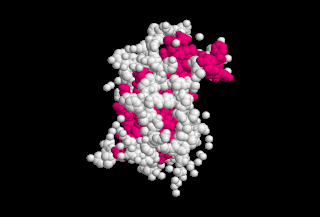
Growth hormone (GH) or somatotropin, also known as human growth hormone in its human form, is a peptide hormone that stimulates growth, cell reproduction, and cell regeneration in humans and other animals. It is thus important in human development. GH also stimulates production of insulin-like growth factor 1 (IGF-1) and increases the concentration of glucose and free fatty acids. It is a type of mitogen which is specific only to the receptors on certain types of cells. GH is a 191-amino acid, single-chain polypeptide that is synthesized, stored and secreted by somatotropic cells within the lateral wings of the anterior pituitary gland.
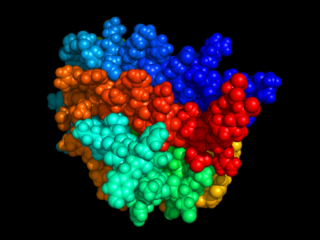
Erythropoietin, also known as erythropoetin, haematopoietin, or haemopoietin, is a glycoprotein cytokine secreted mainly by the kidneys in response to cellular hypoxia; it stimulates red blood cell production (erythropoiesis) in the bone marrow. Low levels of EPO are constantly secreted in sufficient quantities to compensate for normal red blood cell turnover. Common causes of cellular hypoxia resulting in elevated levels of EPO include any anemia, and hypoxemia due to chronic lung disease and mouth disease.
Carbohydrate metabolism is the whole of the biochemical processes responsible for the metabolic formation, breakdown, and interconversion of carbohydrates in living organisms.
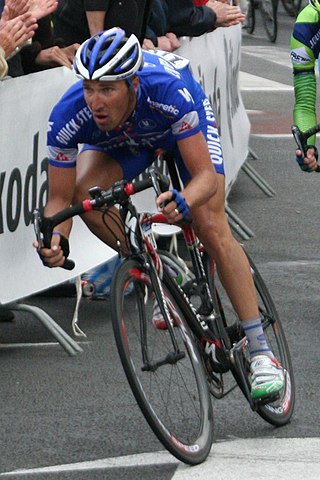
Exercise physiology is the physiology of physical exercise. It is one of the allied health professions, and involves the study of the acute responses and chronic adaptations to exercise. Exercise physiologists are the highest qualified exercise professionals and utilise education, lifestyle intervention and specific forms of exercise to rehabilitate and manage acute and chronic injuries and conditions.
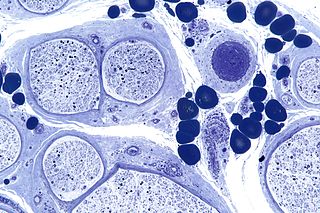
Peripheral neuropathy, often shortened to neuropathy, refers to damage or disease affecting the nerves. Damage to nerves may impair sensation, movement, gland function, and/or organ function depending on which nerve fibers are affected. Neuropathies affecting motor, sensory, or autonomic nerve fibers result in different symptoms. More than one type of fiber may be affected simultaneously. Peripheral neuropathy may be acute or chronic, and may be reversible or permanent.
In competitive sports, doping is the use of banned athletic performance-enhancing drugs (PEDs) by athletes, as a way of cheating. As stated in the World Anti-Doping Code by WADA, doping is defined as the occurrence of one or more of the anti-doping rule violations outlined in Article 2.1 through Article 2.11 of the Code. The term doping is widely used by organizations that regulate sporting competitions. The use of drugs to enhance performance is considered unethical and is prohibited by most international sports organizations, including the International Olympic Committee. Furthermore, athletes taking explicit measures to evade detection exacerbate the ethical violation with overt deception and cheating.

Anaerobic exercise is a type of exercise that breaks down glucose in the body without using oxygen; anaerobic means "without oxygen". This type of exercise leads to a buildup of lactic acid. In practical terms, this means that anaerobic exercise is more intense, but shorter in duration than aerobic exercise.

Altitude training is the practice by some endurance athletes of training for several weeks at high altitude, preferably over 2,400 metres (8,000 ft) above sea level, though more commonly at intermediate altitudes due to the shortage of suitable high-altitude locations. At intermediate altitudes, the air still contains approximately 20.9% oxygen, but the barometric pressure and thus the partial pressure of oxygen is reduced.

Trimetazidine is a drug sold under many brand names for angina pectoris. Trimetazidine is described as the first cytoprotective anti-ischemic agent developed and marketed by Laboratoires Servier (France). It is an anti-ischemic (antianginal) metabolic agent of the fatty acid oxidation inhibitor class, meaning that it improves the heart muscle's ability to use glucose as a fuel by inhibiting its use of fatty acid metabolism. It has become controversial for its use as a performance-enhancing drug, with several scandals involving its use erupting at successive Olympic games.
Blood doping is a form of doping in which the number of red blood cells in the bloodstream is boosted in order to enhance athletic performance. Because such blood cells carry oxygen from the lungs to the muscles, a higher concentration in the blood can improve an athlete's aerobic capacity (VO2 max) and endurance. Blood doping can be achieved by making the body produce more red blood cells itself using drugs, giving blood transfusions either from another person or back to the same individual, or by using blood substitutes.

Sports nutrition is the study and practice of nutrition and diet with regards to improving anyone's athletic performance. Nutrition is an important part of many sports training regimens, being popular in strength sports and endurance sports. Sports nutrition focuses its studies on the type, as well as the quantity of fluids and food taken by an athlete. In addition, it deals with the consumption of nutrients such as vitamins, minerals, supplements and organic substances that include carbohydrates, proteins and fats.
Performance-enhancing substances (PESs), also known as performance-enhancing drugs (PEDs), are substances that are used to improve any form of activity performance in humans.

5-Aminoimidazole-4-carboxamide ribonucleotide (AICAR) is an intermediate in the generation of inosine monophosphate. AICAR is an analog of adenosine monophosphate (AMP) that is capable of stimulating AMP-dependent protein kinase (AMPK) activity. The drug has also been shown as a potential treatment for diabetes by increasing the metabolic activity of tissues by changing the physical composition of muscle.

Erythropoiesis-stimulating agents (ESA) are medications which stimulate the bone marrow to make red blood cells. They are used to treat anemia due to end stage kidney disease, chemotherapy, major surgery, or certain treatments in HIV/AIDS. In these situations they decrease the need for blood transfusions. The different agents are more or less equivalent. They are given by injection.
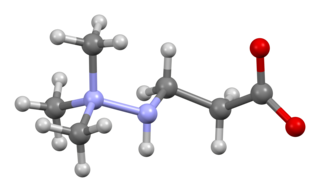
Meldonium is a limited-market pharmaceutical, developed in 1970 by Ivars Kalviņš at the USSR Latvia Institute of Organic Synthesis, and now manufactured by the Latvian pharmaceutical company Grindeks and several generic manufacturers. It is primarily distributed in Eastern European countries as an anti-ischemia medication.
Doping, or the use of restricted performance-enhancing drugs in the United States occurs in different sports, most notably in the sports of baseball and football.

Bemethyl, also commonly referred to in literature as bemitil, is a synthetic actoprotector which is also antihypoxant, antioxidant, and antimutagenic. Bemethyl is primarily classified as an actoprotector: a synthetic adaptogen with significant capacity to increase physical performance.
Doping in figure skating involves the use of illegal performance-enhancing drugs (PEDs), specifically those listed and monitored by the World Anti-Doping Agency (WADA). Figure skaters occasionally have positive doping results but it is not common. Bans can be enforced on figure skaters by the International Skating Union (ISU) and each country's individual skating federation. These bans can often be career ending due to the competitive nature of figure skating. A ban may be revoked if it can be proved that the skater tested positive for a prescribed medication. Some figure skaters will use PEDs to help with recovery time, allowing them to train harder and longer. Figure skating is an aesthetic sport that combines both athleticism and artistic licence, where weight-loss substances will have little effect on athletic performance but skaters may be perceived as more graceful and sleek, which is required for an athlete to be competitive.
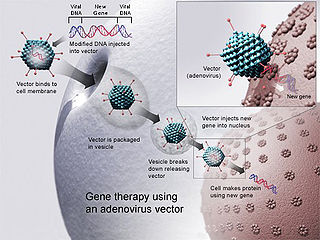
Gene doping is the hypothetical non-therapeutic use of gene therapy by athletes in order to improve their performance in those sporting events which prohibit such applications of genetic modification technology, and for reasons other than the treatment of disease. As of April 2015, there is no evidence that gene doping has been used for athletic performance-enhancement in any sporting events. Gene doping would involve the use of gene transfer to increase or decrease gene expression and protein biosynthesis of a specific human protein; this could be done by directly injecting the gene carrier into the person, or by taking cells from the person, transfecting the cells, and administering the cells back to the person.













